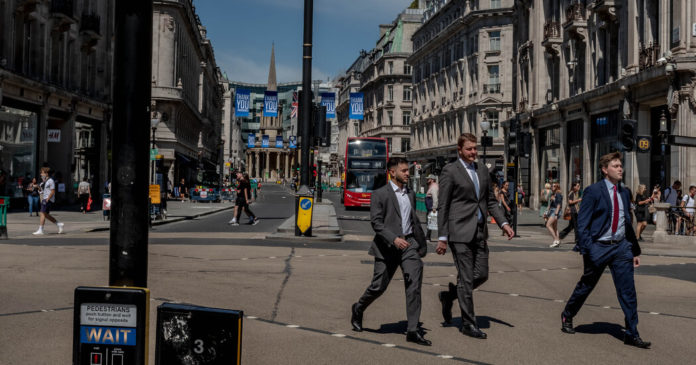LONDON — To understand why Britain has spiraled into the deepest recession of its modern history, go for a stroll in central London, no longer a ghost town but still a shadow of its once-bustling self.
Shuttered storefronts pock the shopping promenade on Oxford Street. Theaters in the West End are dark, office towers deserted. Below ground, the tube is a grim parade of signs warning passengers to wear face masks and keep their distance. With traffic at barely a quarter of last year’s levels, that is not hard.
Only restaurants, buoyed by a government stimulus program that subsidizes diners’ meals, are showing signs of life. But like the government’s widely praised furlough program that guaranteed 80 percent of the salaries of millions of workers, the “Eat Out to Help Out” promotion will soon wind down, and the government faces tough choices about whether to extend the support.
Unquestionably, Britain has been laid low by the coronavirus, easily the hardest hit of any European nation, both in public health and the economy.
“What we’re grappling with is something that is unprecedented, and we don’t have a playbook for how to deal with it,” the chancellor of the Exchequer, Rishi Sunak, told the BBC on Wednesday after the Office of National Statistics reported that the economy shrank by an unheard-of 20.4 percent in the second quarter.
That was the deepest quarterly decline of any major European country, and it prompted a fresh round of hand-wringing in Britain, which has also earned the unwelcome distinction of running up the highest death toll from the coronavirus in Europe, with more than 51,000 fatalities.
In part, Britain’s dire economic numbers reflect a quirk of timing: Prime Minister Boris Johnson imposed a lockdown a week later than most of his European neighbors and lifted the restrictions later as well. That means Britain sustained more damage in the second quarter than France, Italy or Germany, which began reopening during that period.
But Britain’s economic woes are also linked to its broader ordeal with the virus. Because its outbreak was so widespread, prolonged and deadly, economists said, the fear of contagion continues to be higher in Britain than elsewhere. Despite the government’s urging, people have yet to resume normal lives, particularly in cities like London, where working from home is an alternative for many.
Google, which uses cellphone signals to track foot traffic to offices, shops, restaurants and transit stations, shows that commercial activity in Britain has trailed Germany, France, Italy and Spain since mid-May, though the gap has begun to narrow.
“If you have a massive outbreak, people are going to respond by being cautious and it will take a while for confidence to return,” said John Springford, the deputy director of the Center for European Reform, a research institute. “It makes sense that London is going to be among the hardest hit places.”
For all its talk about reopening, Britain still has the strictest set of restrictions in place of any major European country, according to Oxford University’s Blavatnik School of Government, which tracks the stringency of government-imposed restrictions, from schools and workplace closings to travel bans.
It is even more locked down than Spain, which has recently seen a spike in infections that prompted the British government to impose a 14-day quarantine on people who traveled there and returned to Britain.
Like Spain, Britain is particularly vulnerable to a sudden decline in consumption because its economy is more dependent on services, including tourism and hospitality, than those of Germany or France. Economists said it was no accident that Spain’s second-quarter contraction, at 18.5 percent, was closest to that of Britain. The German economy, with its extensive industrial base, shrank by 10.1 percent while France’s fell 13.8 percent.
None of this eases the pressure on Mr. Johnson’s government, which has come under harsh scrutiny for its handling of the pandemic. Until now, its economic measures have insulated people from the sudden dislocation of losing their livelihoods.
But Mr. Sunak insisted the government will stop subsidizing wages altogether at the end of October. He has so far resisted fierce pressure from the opposition and other critics to soften his stand.
“A downturn was inevitable after lockdown, but Johnson’s jobs crisis wasn’t,” said Anneliese Dodds, the Labour Party’s shadow chancellor, who said the government must continue targeted support for vulnerable workers.
The Coronavirus Outbreak ›
Frequently Asked Questions
Updated August 12, 2020
-
Can I travel within the United States?
- Many states have travel restrictions, and lots of them are taking active measures to enforce those restrictions, like issuing fines or asking visitors to quarantine for 14 days. Here’s an ever-updating list of statewide restrictions. In general, travel does increase your chance of getting and spreading the virus, as you are bound to encounter more people than if you remained at your house in your own “pod.” “Staying home is the best way to protect yourself and others from Covid-19,” the C.D.C. says. If you do travel, though, take precautions. If you can, drive. If you have to fly, be careful about picking your airline. But know that airlines are taking real steps to keep planes clean and limit your risk.
-
I have antibodies. Am I now immune?
- As of right now, that seems likely, for at least several months. There have been frightening accounts of people suffering what seems to be a second bout of Covid-19. But experts say these patients may have a drawn-out course of infection, with the virus taking a slow toll weeks to months after initial exposure. People infected with the coronavirus typically produce immune molecules called antibodies, which are protective proteins made in response to an infection. These antibodies may last in the body only two to three months, which may seem worrisome, but that’s perfectly normal after an acute infection subsides, said Dr. Michael Mina, an immunologist at Harvard University. It may be possible to get the coronavirus again, but it’s highly unlikely that it would be possible in a short window of time from initial infection or make people sicker the second time.
-
I’m a small-business owner. Can I get relief?
- The stimulus bills enacted in March offer help for the millions of American small businesses. Those eligible for aid are businesses and nonprofit organizations with fewer than 500 workers, including sole proprietorships, independent contractors and freelancers. Some larger companies in some industries are also eligible. The help being offered, which is being managed by the Small Business Administration, includes the Paycheck Protection Program and the Economic Injury Disaster Loan program. But lots of folks have not yet seen payouts. Even those who have received help are confused: The rules are draconian, and some are stuck sitting on money they don’t know how to use. Many small-business owners are getting less than they expected or not hearing anything at all.
-
What are my rights if I am worried about going back to work?
-
What is school going to look like in September?
- It is unlikely that many schools will return to a normal schedule this fall, requiring the grind of online learning, makeshift child care and stunted workdays to continue. California’s two largest public school districts — Los Angeles and San Diego — said on July 13, that instruction will be remote-only in the fall, citing concerns that surging coronavirus infections in their areas pose too dire a risk for students and teachers. Together, the two districts enroll some 825,000 students. They are the largest in the country so far to abandon plans for even a partial physical return to classrooms when they reopen in August. For other districts, the solution won’t be an all-or-nothing approach. Many systems, including the nation’s largest, New York City, are devising hybrid plans that involve spending some days in classrooms and other days online. There’s no national policy on this yet, so check with your municipal school system regularly to see what is happening in your community.
Mr. Sunak contends the government cannot guarantee wages indefinitely because some jobs are never going to come back after the pandemic. Encouraging people to look for new jobs is vital to giving them a sustainable future.
Still, a huge spike in the unemployment rate will be hard for Mr. Johnson’s Conservative government to withstand, especially since it ran on a platform of bringing prosperity to Britain’s industrial north. The drumbeat of job losses is already underway: On Tuesday, the troubled department store chain, Debenhams, announced 2,500 job cuts on top of a previously announced 4,000.
Critics said it was unreasonable for the government to force people back into the job market when Britain’s test, trace and isolate system was not robust enough to give them confidence that they can move around safely. That is particularly true in parts of the country like Leicester and Greater Manchester that have suffered fresh outbreaks and have been put under local lockdowns.
“The government has taken a one-size-fits-all approach to ending the job retention program,” said James Smith, research director at the Resolution Foundation, a London research institute. “But the economic response has to be targeted to where the economy is hardest hit.”
Mr. Sunak has tried to do that with “Eat Out to Help Out,” a 500 million pound ($654 million) program to bolster the beleaguered restaurant industry by subsidizing the meals of customers by up to £10 ($13) per person. As of Aug. 9, the government said people had bought 10.5 million meals using the incentive.
At the German Gymnasium, a cavernous restaurant next to Kings Cross railroad station, the promotion drew a respectable crowd on Tuesday night — comparable, the general manager, Sam Bernard, said, to a weekend night. He said his only request would be for the government to extend it to Thursday night.
Like most restaurants, the German Gymnasium faces murky prospects. It depends on business from Google and Facebook, which have offices nearby. But both companies have told their employees they can work from home until at least next summer. And the government’s subsidy ends on Aug. 31.
“We can’t rely on government support forever,” Mr. Bernard said. “If it does stop, we will just have to fend for ourselves and think a bit outside the box.”
Anna Joyce contributed reporting.
Source : Nytimes








![EFG Companies Cautions Retail Automotive Dealers, Lenders, Partners to Maximize Data Security Measures [SPONSORED] | Auto Finance News](https://www.oneworldmedia.us/news/wp-content/uploads/2018/04/canstockphoto7356910-218x150.jpg)



